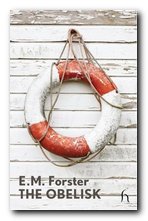tales from E.M.Forster’s reserve collection
The Obelisk is a collection of stories taken from The Life to Come (1972), works not published during Forster’s lifetime, which ended in 1970, not long after the famous trials of Lady Chatterley’s Lover and Last Exit to Brooklyn. One reason is that they all deal quite explicitly with homo-erotic topics which would not have been tolerated in print before 1970. The other reason might be that they fall so far below the artistic standards of his other work.
 Some are mild satires of middle-class snobbery and hypocrisy set in a slightly indeterminate era which might be Edwardian or Georgian at the beginning of the last century. Others are satires of Biblical and mythical subjects treated in a manner which is supposed to be amusing, but which conjure up an embarrassing attitude poised somewhere midway between lyricism and schoolboy smuttiness. If these stories belonged to Forster’s desk drawer, there might be some good arguments for having left them there.
Some are mild satires of middle-class snobbery and hypocrisy set in a slightly indeterminate era which might be Edwardian or Georgian at the beginning of the last century. Others are satires of Biblical and mythical subjects treated in a manner which is supposed to be amusing, but which conjure up an embarrassing attitude poised somewhere midway between lyricism and schoolboy smuttiness. If these stories belonged to Forster’s desk drawer, there might be some good arguments for having left them there.
In the title story a conventional married couple meet two slightly dubious sailors on a day out. The wife enjoys a snatched liaison with one of them, but then is shocked to discover that her husband might have done the same thing with the other.
A missionary converts a local chieftain by succumbing to his sexual advances, then feels guilty for doing so. The two men grow apart and marry, but when the chieftain is about to die there appears to be an emotional reconciliation. What actually happens is a tragedy of Imperialism.
In another story, an old country squire who is dying imagines that he is still desirable to a young man working on his estate as a hired labourer. The story is related in a lyrical, quasi-poetical manner, but it reads as a rather unconvincing piece of homo-erotic wishful thinking on the part of an older man.
Similarly, in the unfortunately titled ‘Arthur Snatchfold’ a sexual encounter between a young workman and a rich industrialist is the occasion for a critique of society’s punitive attitude to gay men, and another improbable piece of ill-sublimated wish-fulfilment about older men being sexually desirable to male youths.
Almost all these stories have in common sexual encounters between an older man from the upper echelons of society and a much younger man from the lower. It very difficult to escape the suspicion that Forster was writing these stories late in life as therapeutic exercises.
‘What does it matter?’ is a silly tale set in a Gilbert and Sullivan Ruritania-like country whose president is caught in flagrante with a handsome young guardsman. Some of the other pieces are not much more than extended jokes, using classical mythology and even religion as a vehicle for nudge-nudge remarks about fig leaved statues and well-endowed young boys.
The best story in the collection – ‘The Other Boat’ – is the only serious attempt to explore both the gay and the Imperial theme. A young British officer becomes entangled in a shipboard dalliance with his Anglo-Indian cabin mate. The forbidden passion ends in murder and suicide, but at least their relationship is explored in some depth
We know that Forster stopped writing fiction after A Passage to India because he could no longer believe in creating credible heterosexual relationships, and of course at the time it was not possible to publish fiction which was explicitly homosexual. But this leaves us with something of a conundrum, because the homosexual relationships Forster did manage to write about (even if he did not publish them) are far less credible than the heterosexual ones which were a product of his creative imagination.
So this collection The Obelisk acts as a salutary tale to those who believe that authors can only write well on subjects known from personal experience. And it also supplies evidence that even distinguished writers sometimes produce work which is well below their normal standards, even when writing on topics which are close to their hearts.
© Roy Johnson 2010
E.M.Forster The Obelisk, London: Hesperus Press, 2009, pp.169, ISBN: 1843914360
More on E.M. Forster
More on the novella
More on literary studies
More on short stories